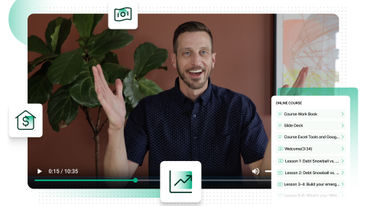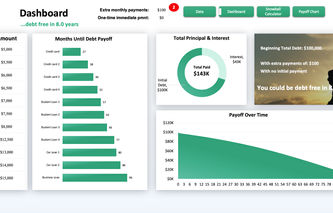The Federal Reserve says the median student debt lies somewhere between $20,000 and $24,999—so the $100k is definitely not the norm. In any case, paying off $100,000 in student loans sounds agonizing.
But you already know that—which is probably why you’re looking for ways to get rid of this mammoth debt.
Look no further, because we’ve got you covered—
The top ten practical tips to pay off your 100k student loan debt.
Different debt repayment strategies that can change your life.
Useful resources on paying off student loans fast.
Answers to some of the most common questions around student debt.
Check out more articles on student loans:
Get out of student loan debt faster with our free tools:
Best Way to Pay Off Student Loans: Our Top Ten Practical Tips
1. Seek student loan forgiveness
Tons of organizations are willing to help students pay their debt, so look for loan forgiveness and repayment assistance programs.
You want to prioritize these programs at the beginning of your repayment journey as they can affect other choices, such as refinancing or making extra payments.
These programs are geared toward graduates working for non-profits, in the public sector, or in other specific fields.
Here are some popular ones:
Public Service Loan Forgiveness: for borrowers employed by a government or nonprofit organization.
Teacher Loan Forgiveness: for educators working in a low-income elementary school, secondary school, or educational service agency.
Closed School Discharge: for students whose school closed while they were enrolled.
The only real hiccup is that the competition in these programs is fierce—meaning you’ll need to prove that your financial situation is poor to repay the loan.
2. Try the debt snowball method
The debt snowball method is a popular repayment strategy that can pull you out of the vicious cycle of loans.
This method is also one of the fastest ways to pay off student loans.
And the Harvard Business Review agrees. In their research “The Best Strategy for Paying Off Credit Card Debt,” Harvard says the snowball technique works because—
It offers a clear roadmap of your finances, eventually leading to a debt-free life.
Increases your motivation by focusing on individual debts.
Helps you gain momentum through a series of small wins.
How does the debt snowball method work?
This incredible debt repayment strategy focuses on paying off your smallest debt first with minimum payments.
Once you’ve cleared that debt, you use this momentum to eliminate the next smallest debt, and so on. Snowballing your student loans can effectively help you focus on a single debt at a time.
Curious to see if this method works for you? Check out our Free Student Loan Debt Snowball Spreadsheet.
(Want something more? Want to get out of debt in a year or less? Check out our new Get Out of Debt course.)

3. Experiment with the debt avalanche method
The debt avalanche method is a debt repayment strategy that focuses on paying off debts with the highest interest rates first.
So, you’ll pay off the debt with the highest interest rate first, and then move on to the debt with the second-highest interest rate.
You repeat the process until you’ve paid off student loans.
Here’s an example—
Let’s assume you have a personal loan of $10,000 at an 18% interest rate, a credit card debt of $5,000 at a 16% interest rate, and a student loan debt of $4,000 at a 7% interest rate.
With the debt avalanche method, you’d pay off the personal loan first (debt with the highest interest rate), followed by the credit card debt, and the student loan.
On the other hand, following the debt snowball method would mean you’d pay off the student loan first (the smallest debt), followed by the credit card debt and the personal loan.
You can check out our Free Debt Avalanche Spreadsheet to see if this works for you.
Are these debt repayment options making you scratch your head in confusion?
Jay Zigmont, founder of Childfree Wealth, shares his two cents:
Overall, the avalanche method will get you out of debt quicker while saving more money. But I usually recommend the snowball method to my clients. That’s because this method lets you celebrate small wins and cross off debts as you keep moving forward. The debt snowball’s greatest advantage is the psychological boost it can give you.
4. Pay off student loans early
The suspension on student loan repayments has been extended nine times since Congress passed the CARES Act in March 2020.
But everything good has to come to an end—and repayments are expected to restart in August 2023.
Should you take advantage of this break and make plans for later this year? Sure thing.
However, if you’re in a position to make payments, do so straight away.
This is the quickest approach to paying off student loans because you can continue making loan payments without incurring any new interest during the forbearance period.
5. Make payments while you’re in school
We get it. It's tempting to put off payments while you’re still in school.
But keep in mind that your loan continues to earn interest (which you must pay later) even during this deferral time.
When you graduate and your repayment period kicks off, any accumulated interest is capitalized, meaning it’s added to your original loan sum. So the new loan balance is the amount you must repay.
But how can you pay off your debt faster while you’re still in school?
Now, making complete monthly payments will obviously help strike off your debt. Most students can’t afford this, though.
Mark Kantrowitz, President at PrivateStudentLoans.guru, shares some tips:
Some private student loan providers give you an interest rate reduction when you pay off student loans during the in-school and grace periods. The options can include a fixed payment (typically $25 per loan per month), interest-only payments, and fully amortized payments.
Apart from picking the right payment plan, tell your lender which loans your extra payments should go to. You may want to first focus on unsubsidized or private loans or loans with the highest interest rates.
6. Choose a shorter repayment term
Selecting a shorter repayment period will help you save money on interest rates in the long run.
You’re basically making greater monthly payments. This means you’ll pay off the loan faster and pay less interest overall.
Plus, a shorter repayment term will help you attain financial independence sooner.
Paying off your debt sooner will also let you put more money towards other goals, such as saving for a down payment on a house or putting money aside for an emergency.
On the other hand, choosing a longer repayment period may encourage you to make only the minimum payments each month, resulting in increased interest and the possibility of defaulting on your loan.
7. Pay more than your minimum payment
The goal here is to quickly pay off your student loan principal and interest faster—not to make your lender richer.
So while making extra payments, make sure you’re asking your bank to redirect the extra payments to your loan’s principal amount rather than the interest.
Keep in mind that the principal is the amount of debt you must repay, whereas the interest is the price you pay your lender for borrowing money.
Paying off the principal will help you pay off your student loans significantly faster.
8. Refinance your student loan
We’re certain everyone wishes life came with a “redo” button.
The universe isn’t so kind—but your new lender can be.
When you refinance your student loans, you take out a new loan with a private lender. The lender then pays off your existing debt and offers you new terms.
When done right, refinancing student loans can lower your interest rate and monthly payments by thousands of dollars.
This tip is especially beneficial if your credit situation has changed from the time you took out your first loans.
As you graduate and start working, you’ll most likely start building a credit history—resulting in a better credit score than when you were 18.
A better credit score will let you qualify for lower interest rates, so you’ll end up with lower monthly payments.
Don’t qualify to refinance student loans on your own? You may qualify with the help of a cosigner with a great credit score.
Mind you, refinancing your federal student loan into a private one can mean that you lose certain benefits and repayment options.
9. Sign up for automatic payments
This is one of the smartest ways to pay off student loans (also the easiest).
Signing up for autopayments will typically fetch you a 0.25% reduction in your student loan interest rate.
This is a simple yet effective way to reduce your total loan cost and repay your debt quicker.
Plus, automating payments will ensure you don’t miss monthly installments.
10. Increase income, not expenses
You want to fatten up your financial cushion for long-term financial success.
But how do you go about increasing your income?
Here are some practical tips—
Boost your sources of income by taking up a side hustle, freelancing, or starting a small business.
Upskill to qualify for higher-paying job opportunities.
Explore passive income streams such as investments, rental properties, or online businesses.
Negotiate a raise or promotion with your current employer.
Monetize your hobbies or talents through platforms like social media.
But increasing your income is just one part of the story. The key to a debt-free life is avoiding lifestyle inflation—a classic situation where your expenses increase with your income.
Start budgeting now to avoid this scenario. Creating a detailed budget will help you prioritize your expenses and ensure you don’t overspend. This way, you can easily set aside more money to repay your debt in a shorter period.
The whole thing can come off as an intimidating task. But we’ve got your back.
Start budgeting efficiently with our free and ready-to-use budget templates:
Useful Resources on How to Pay Off Student Loans Fast
Wondering how to pay off college debt?
There’s tons of help available, including government programs, repayment strategies, and other useful tools.
Here are our top picks for resources on how to pay off student debt:
The United States Department of Education can help you understand college expenses and explore ways for minimizing them. Use the exit counseling tool to plan your education expenses for the year and estimate your projected student loan balance against your future monthly income.
StudentAid.gov gathers information from all of the loan servicers to provide you with a full picture of all of your federal student loans.
The U.S. Department of Education’s payment calculator can help estimate your monthly repayment amount for the student debt you currently have and any additional debt that you expect to borrow. Use it to help you estimate what your monthly payments will look like after school.
Use our free weekly and monthly budget calculators to manage your expenses while you’re in school. Setting a budget will help you keep track of your income and expenses to make sure you’re not borrowing more than you can afford.
Use our free debt snowball spreadsheet to plan your repayment strategy and pay off your student debt faster.
Key Takeaways
It’s one thing paying off a small loan, but it’s an entirely different ballgame trying to pay off $100k in student debt.
It’s daunting and isn’t something that’s going to happen overnight. But it’s important to remember that there’s a method to this madness.
Evaluate the different debt repayment strategies we’ve discussed in this article, along with best practices like budgeting, exploring repayment options, and diversifying income.
Paying off $100,000 in student loans will take dedication and persistence—but you can make it all bearable with a solid plan.




.jpg)

